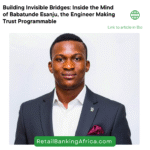Artificial intelligence (AI) in Africa is often discussed in the context of policy roadmaps, startup funding, or global competition. But on the ground, progress depends on individuals who choose to return, stay, and build. One of them is Dr. Chika Yinka-Banjo, who in 2018 founded the Artificial Intelligence and Robotics Lab (AIRLAB) at the University of Lagos (UNILAG).
Her journey began with a mathematics and computer science degree at the Federal University of Technology, Imo State. Finding it too theoretical, she pursued advanced studies across Nigeria and South Africa, culminating in a Ph.D. from Stellenbosch University. Rejecting opportunities to remain abroad, she returned home, determined to “give something to the younger generation.”
Backed initially by Canada’s International Development Research Centre (IDRC), AIRLAB started in a small office and grew into UNILAG’s Central Research Laboratory. The lab’s vision is ambitious: to become a global hub for AI and robotics research in Africa. In practice, AIRLAB has hosted summer programs, robotics competitions, and training initiatives—including a 2025 Lagos edition of NaijaCoder, funded by MIT, which introduced secondary school students to computational thinking and AI foundations.
Yet, challenges remain stark. Most available grants prioritize youth outreach programs over applied research, leaving labs like AIRLAB with limited support for solving Nigeria’s pressing local challenges in education, agriculture, and healthcare. “It is the ones that have children in them that get funding,” Dr. Yinka-Banjo noted, even though long-term impact depends on sustained research.
Despite these barriers, AIRLAB has begun carving new pathways. In Q2 2025, it secured funding from the IDRC and UK Foreign, Commonwealth & Development Office to launch an AI for Education initiative. The project aims to design AI-powered learning assistants that function in low-connectivity environments—directly addressing Africa’s digital divide.
For young researchers like Mariam Muhammed, who joined AIRLAB as a Ph.D. candidate after a stint in industry, such opportunities signal a new possibility: contributing to African-focused AI solutions without leaving home. Undergraduate interns, too, are finding purpose—like mechanical engineering student Owolala Olaoluwasubomi, who is building a robotic arm during his placement.
Still, the contrast with peers like Egypt and South Africa is glaring. Both countries invest heavily in AI research and dominate Africa’s rankings for publications and university excellence. Nigeria lags far behind—its highest-ranked university, the University of Ibadan, sits at 50th place in Africa.
Even so, labs like AIRLAB represent more than research—they are seedbeds of Africa’s AI future. As one policy expert observed, today’s lab projects may evolve into tomorrow’s startups, capable of shaping markets and narratives far beyond Lagos.











